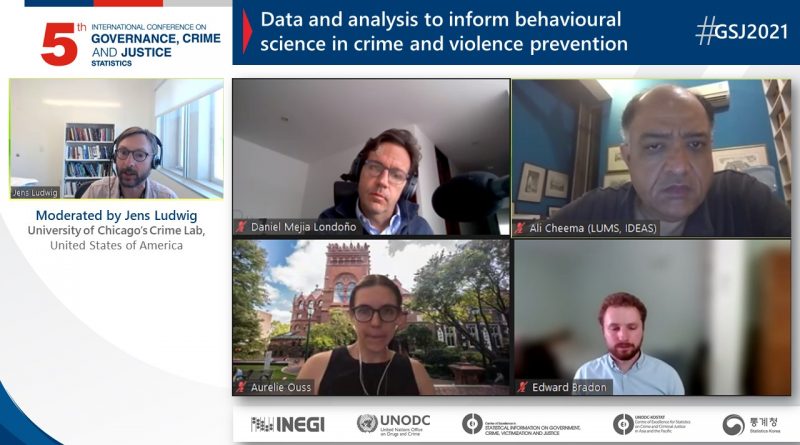The 5th International Conference on Governance, Crime and Justice Statistics kicks off
Mexico City, June 14, 2021. The 5th International Conference on Governance, Crime and Justice Statistics (GSJ2021) kicks off as a space to foster dialogue between the actors that generate statistical information on crime and criminal justice and its users.
During the opening of the GSJ2021, Mr. Kristian Hölge, Representative of the United Nations Office on Drugs and Crime (UNODC) in Mexico, welcomed the inaugural panel and the 69 international experts who will share their experiences and knowledge during the next four days.
Ms. Ghada Waly, Executive Director of UNODC, highlighted the work of the UNODC Centers of Excellence to improve the generation and quality of data to combat crime, to address the challenges of the COVID-19 pandemic, and to incorporate the gender perspective in crime statistics. She recognized the importance of promoting this type of spaces for the exchange of experiences and to be able to develop Statistical Systems according to the needs of each country.
For his part, Mr. Keunkwan Ryu, Commissioner of Statistics of Korea KOSTAT, emphasized that given the threats that have arisen due to the COVID-19 pandemic caused by transnational crimes, as well as hate crimes and individual crimes such as domestic violence and child abuse, it is necessary for governments to work in a cross-border and coordinated manner to face the challenges in terms of statistics, which is why in the 14 scheduled sessions the new paradigms in these crimes will be discussed.
The President of the National Institute of Statistics and Geography INEGI of Mexico, Mr. Julio Santaella, pointed out that GSJ2021 is a space for dialogue on the production and demand for information, as well as to promote the use and analysis of data for policy design, in addition to being an event to open the discussion on a roadmap for methodological development, capacity building and data collection.
Finally, Mr. Kristian Hölge, acknowledged that the pandemic has also brought opportunities, such as the possibility for two thousand people from more than 40 countries to be connected in this event.
Three interesting sessions were held during the first day:
- Data and analysis to inform behavioural science in crime and violence prevention
- Assessing the short-term and the long-term impact of COVID-19 on crime
- Improving knowledge on trafficking in persons
In the first session, the use of behavioral science tools in relation to crime and criminal justice was discussed. The potential opportunities and challenges of these tools were analyzed, including the review of data infrastructure, focus groups experiments in different countries, among other topics.
The second session brought together specialists who examined empirical evidence on the impact of COVID-19 on different types of crime around the world. Each contribution examined the lessons that can be learned for crime prevention and criminal justice policy in the short term and beyond the pandemic.
Finally, the third session discussed lessons learned for improving data on human trafficking from the experience of Uganda, where vulnerable populations, such as women and children, have a high likelihood of being exploited for labor or sexual purposes.
We thank our panelists Edward Bradon, Aurelie Ouss, Ali Cheema, Daniel Mejía, Hervé Borrion, Fatma Usheva, Manuel Eisner, Oscar Jaimes, Andrea Hughes, Mutaawe Rogers, Alyssa Currier Wheeler, Kyle Vincent and our moderators Jens Ludwig, Adrián Franco and Meredith Dank for their enriching participation.



